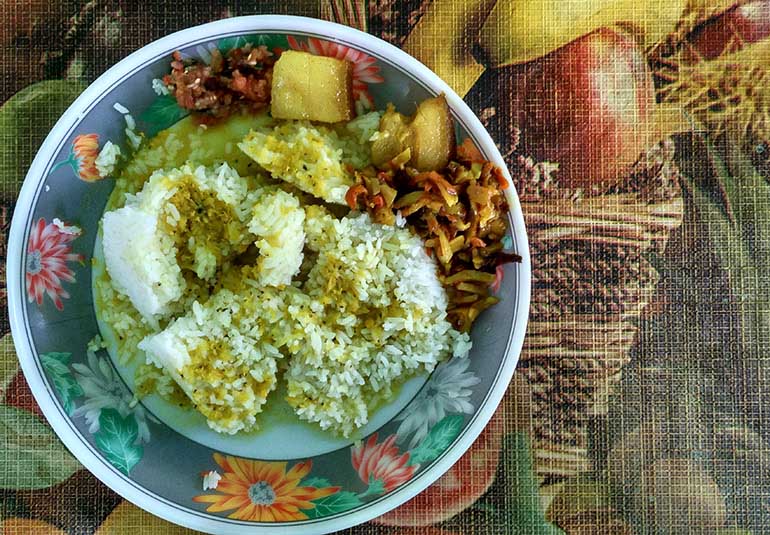How To Eat Like A Local In Meghalaya
- By Shirin MehrotraLoading...
- | 20 April 2017 12:58 PM IST
 X
X
 Kong shops are run by the local Khasi women. Photo: Shirin Mehrotra
Kong shops are run by the local Khasi women. Photo: Shirin Mehrotra
It’s around 6 pm when we reach Mylliem, a small village between Shillong and Cherrapunji. It still isn’t reasonable time for dinner, but our half-hearted lunch at a generic roadside dhaba has long disappeared making our stomachs grumble. We spot tiny restaurants on both sides of the street and stopover for some grub. We walk into a small wooden house like shop with curtained windows.
From the outside the place looks like a cheap liquor shop; a couple of women sitting outside selling smoked meat. Inside, a part of the room has a few rickety tables and a long bench, and other half is turned into a kitchen. We see women dressed in ka jainsem – loose tunic and jain-kyrshah – chequered cotton cloth knotted over one shoulder, cleaning and swabbing or serving food.
These are Kong Shops, the quintessential eateries of Meghalaya serving local Khasi food where locals walk in for jingbam – snacks and cha or tea. Kong means sister in the Khasi language and that’s where they get the name from since these shops are run by women.
 Local Khasi food is typically rice and meat. Photo: Shirin Mehrotra
Local Khasi food is typically rice and meat. Photo: Shirin Mehrotra
There’s no menu here. You ask for whatever has been cooked that day and get served a meal of local dishes – mostly pork or other meat cooked in various ways - along with rice. Dal, rice, tungrymbai – a paste of fermented soybean, sesame seeds slow-cooked with pork, tungtap – dried fish chutney, dohkhlieh – boiled pork salad with ginger and onion make for our first local meal in Meghalaya. The strong smell of tungrymbai puts us off initially, but once you get past the aroma the dish takes simple dal-rice meal a few notches up.
Meghalaya comprises of three major districts – Khasi hills, Garo hills and Jaintia hills and the food is different in each region. The Garos eat a lot of yam, greens and use sodium bicarbonate in their cooking. While sesame seeds are used all across, the Jaintias love them a little more than the rest of the tribes. Apart from the slight variations, ja – rice and doh – meat (pork, beef, chicken) are part of the staple diet all over Meghalaya.
“In Khasi cooking, you can taste the real flavour of the meat. Cooking is simple with just onions, ginger and chillies and we use mustard oil,” says Teiskhem Lynrah, a resident of Shillong and co-founder of Meraki – a food pop-up that promotes Khasi and Kumaoni cuisines in Mumbai. “There’s a chicken curry that’s made with just caramelised onions and a pork stew, which is just the meat cooked in water with raw turmeric, it doesn’t even have salt,” she adds pointing out the simplicity of the cooking.
 Khasi cooking doesn't use too many spices. Photo: Shirin Mehrotra
Khasi cooking doesn't use too many spices. Photo: Shirin Mehrotra
Fermentation and smoking are the two ways locals use to preserve meat here. “We smoke our meat a lot. Earlier when there was no refrigerator we did it to preserve the meat, but the cooking form has stayed even now because the flavour of smoked meat cannot be replicated in any other way,” says Lynrah. This meat is later used to make stir fries and stews, which is eaten with tungtap – chutney made with small dried fish.
Jadoh and dohklieh are the star dishes of Khasi cuisine. Jadoh literally means rice cooked with meat. Traditionally the rice is soaked in pork blood and cooked with meat, but the version served at Kong shops or jadoh stalls doesn’t stick to this recipe anymore; here you’ll get rice cooked in pork fat. That’s the case with dohklieh too; the salad originally uses pork brain as dressing. Black pudding or blood sausage is another famous delicacy.
Over the next few days we hop into a Kong shop every chance we get to feast on jadoh with dohneiiong – pork cooked with sesame seeds, meat balls, chicken curry and fried fish; washing it all down with laal chai – red tea.
Pro-tip: Stopover at Mylliem between Shillong and Cherrapunji to get the best local food. Smit, which is around 11 kms from Shillong, is where you’ll get good jadoh. Don’t forget to pick up some kyat – local rice wine on your way.



